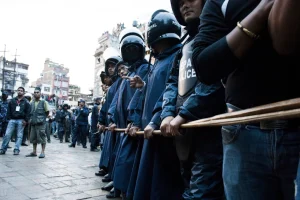
Strikes hit Greater Manchester buses
Ian Allinson •Most buses in Greater Manchester have been cancelled as coordinated strikes have hit eight depots of three bus companies. Greater Manchester rs21 members report on the first major strike since Andy Burnham launched the franchised Bee Network.
There have been a number of bus strikes in Greater Manchester in recent years, most notably the 12-week battle at the Queen’s Road depot when that was operated by Go Ahead. But the current strike is on a different scale, with eight depots striking at once. This matters, because bus companies have previously brought in drivers and managers from elsewhere in the country to run scab services, or subcontracted services to scab operators. With over 2,000 Stagecoach, Metroline and First Bus workers involved, operators’ capacity to undermine the impact of the strike is limited.
Irving Cumberbatch, Unite branch secretary at Metroline’s Hyde Road depot in Manchester, explains:
The dispute is over pay, and Unite General Secretary Sharon Graham says: ‘These companies are very profitable but are putting greed over their hardworking members of staff.‘ So far strikes have been called for 19 to 22 September and 30 September to 2 October. Graham said ‘Unite is not afraid to escalate to more strikes, which will only intensify going forward.‘
Two factors have led to the coordinated action. The first is that part of Sharon Graham’s strategy for Unite is to align pay anniversary dates, which makes coordinated action more possible. All the depots involved in the strikes were due a pay rise in April. More depots will be aligned next year.
The second factor is Greater Manchester’s Bee Network. Since the 1980s bus services outside London have been deregulated, with private operators deciding most routes, timetables and fares – contributing to rising fares, deteriorating services and declining bus patronage. Over the last few years Greater Manchester adopted a franchising model, similar to London’s, where Transport for Greater Manchester (TfGM) specifies fares, routes and frequencies; receives ticket revenue; and pays private operators to run services on its behalf. Several other areas including West Yorkshire, Liverpool City Region, West Midlands, Strathclyde and Wales plan to follow suit.
The effect is that there are two sets of people who could settle the strikes. The bus operators could fund decent pay rises out of their profits, or TfGM could increase funding to cover pay rises. Both groups will doubtless plead poverty. Several bus operators made low bids for franchising to establish themselves in a marketplace they expect to grow, and workers complain that TfGM accepted bids knowing they didn’t allow for adequate pay increases. This contributes to many drivers seeing franchising as a mess. Funding through taxation for public transport is simply too low – particularly in the context of a climate crisis and ever increasing congestion.




The Bee Network has also meant lots of change for drivers. Simon Thomas, Unite branch secretary at Stagecoach’s Stockport depot and Convenor for Stagecoach in Manchester explained that members have ‘rightly refused to accept a below-inflation pay offer which also fails to recognise the additional pressures and responsibilities they face under the Bee Network‘.
Historic inconsistencies in between depots are contributing to workers’ anger. At First’s Rochdale depot, drivers want parity with the rest of Greater Manchester, complaining that they have fewer holidays, lower pay and no overtime payments.
Thomas explained that ‘Unite the Union remains committed to working towards a unified pay rate for Manchester that reflects the requirements of bus driving under Andy Burnham’s Bee Network‘. He said that ‘Spirits were high and the mood was optimistic‘. Stockport pickets succeeded in turning away a fuel delivery tanker.
The stakes in the dispute are high for Greater Manchester Mayor Andy Burnham, as rumours swirl about him making a bid to replace Keir Starmer. To add to his woes, hundreds of UNISON and Unite members at TfGM are currently balloting in their own pay dispute and could take action from mid-October, after a successful dispute before Christmas. The pressure is on for Burnham to resolve these disputes.
Pickets are normally from around 4am-5pm at the following locations:
METROLINE
- Hyde Road depot, Ardwick, M12 6JS
- Sharston depot, Leestone Road, Wythenshawe, M22 4RB
- Ashton depot, Unit 5 Riverside Works, Clarence Street, Stalybridge, SK15 1QP
- Wythenshawe depot, Greeba Road, Wythenshawe, M23 9ET
STAGECOACH
- Stockport depot, Daw Bank, Stockport, SK3 0DU
- Oldham depot, Wallshaw Street, Oldham, OL1 3TR
- Middleton depot (temporary location), 761 Tweedale Way, Chadderton, OL9 7LD
FIRST
- Rochdale Interchange, OL16 1TU







0 comments